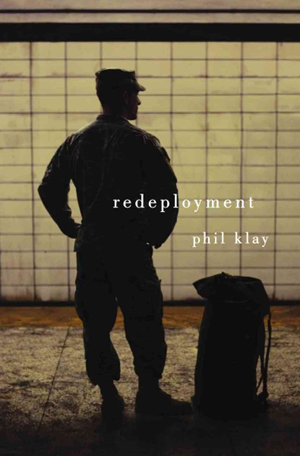
by by Margaret Kolb

Published by Penguin Press, 2014 | 288 pages
Phil Klay’s Redeployment has enjoyed exuberant critical acclaim since its release in March of this year, and by any reckoning, it is deserved. As an author he seems to have accomplished what nearly every veteran author in the last decade has attempted: an artistically masterful and psychologically comprehensive articulation of the tensions felt by veterans between their military and civilian identities. Now nearly twelve years since the start of the Iraq war, it seems enough time has finally passed to enable the author to undergo the two necessary metamorphoses that make possible a work of this aesthetic caliber. Klay had to surrender the veteran community’s mystique – its “trump card” in any conversation – and confront the mistakes that were made, some of which were horrific. Similarly, Klay had to engage with his place in the civilian community, to evaluate their perceived sense of agency in a decade that has produced a massive expansion of the state security apparatus and, paradoxically, a far less safe world. Klay’s is the first piece of 21st century veteran literature with the balance of artistic brilliance and force to drive the public and academic discussion forward, from one that simply portrays the war, to one that assesses and ameliorates its aftermath.
Redeployment is a collection of short stories, each following an American service member or civil servant protagonist through a tightly constructed narrative arc. The stories are not Klay’s own from his service as a Marine in Iraq, but adaptations of interviews and submissions from members of the veteran community. The layered significance of the word that titles the book, “redeployment,” provides the thread that connects each narrative. It is undoubtedly the most poignant word in any veteran’s vocabulary. As “redeployment” approaches, we oscillate between joy and excitement, anxiety and fear, anger and resentment, and a state of constant agitation that I can only define as a tug-of-war between petrifying fear that something bad will happen right before “redeployment,” and unrealistically blissful expectations for the arrival home. Once arrived, disillusionment sets in, and the journey to reconcile and remake an identity begins. With time, the emotional tumult fades into ennui and nostalgia, but the struggle for identity is one that each individual Soldier must achieve him or herself.
Redeployment’s first and eponymous story treats this struggle directly. On a gruesome tour that bore witness to a best friend’s violent death, the horror of an insurgent torture cell, and sickening child sex abuse, it is the shooting of dogs that the recently returned Marine cannot escape. The story contains all of the clichéd post-deployment anecdotes: a Marine whose wife is five months pregnant (it was a seven month tour), another who stays drunk for ninety-six hours upon realizing his wife has left him and taken his money, and another who purchases a motorcycle and begins to recreate the thrill of combat through high speed joy rides. The next story, “Frago,” also traditional for this genre, is a classic combat vignette, following a squad as it clears a safehouse, a brief firefight that results in a wounded Marine and two killed insurgents, and the rescue of two tortured Iraqi Army Soldiers in the basement. The subsequent stories approach the challenge of “redeployment” from perspectives that operate on the periphery of the classic Marine grunt. In “Bodies,” a mortuary affairs veteran (one who collects, catalogues, and remits the remains of the dead) struggles with how to answer people who ask what he did on his deployment. “In Vietnam they had Whores” is a darkly comedic account of two recently returned Marines that pay for sex in a strip club.
Klay’s preferred motif is to counterpose dialogue - between military and civilian or combat and noncombat voices - to expose the gulf in experience and understanding. Through their exchanges, the characters travel towards recognition of that gulf, exploring and elucidating this liminal space for the reader. In the story “Psychological Operations,” a veteran confronts an activist college student, and in “War Stories,” a wounded and disfigured veteran conducts a tense interview with an aspiring actress who is working on a documentary. Perhaps the most complex and provocative exchanges of the collection come from the chaplain featured in “Prayer in the Furnace.” Through conversations with a line Soldier who is losing himself to the violence and the debauched culture of his unit, the priest chaplain reflects on Augustine, Aquinas, and his own beliefs and experiences in an attempt to contextualize the horror he sees in that grunt’s military unit, and determine his own ethical obligation.
The content of Redeployment is stark, but its content does not separate the work from several other engaging texts created by veterans in the last few years. Bonenberger’s Afghan Post, Gallagher’s Fire and Forget: Short Stories from a Long War, and Hamilton’s What Changes Everything are, among others, works that also explore the introspective conflict between military and civilian identities among service members. Truly, in the last decade, veteran artists have created a vibrant community and impressive body of work centered on the challenge of reconciling combat experience with identity.
Redeployment transcends, ultimately, in its art. It culminates a decade of exhaustive searching for the language and the technique needed to reveal the veteran’s experience, while balancing the dissonant voices that demand attention in this genre. Those who have served demand recognition, solidarity, and honesty of expression. Those who have not served demand access, resolution, and honesty of effect. Klay accommodates all, and without sacrificing the edge or the force necessary to captivate. Each story contains a tightly constructed narrative arc that illuminates a single problematic aspect of reintegration without obfuscating or minimizing the multitudinous competing forces (“reintegration” is a loaded term for those who have experienced this formal post-deployment process). Swofford, the author of Jarhead, describes Klay’s stories here as “tightly wound psychological thrillers,” and though that language is misleadingly dramatic, it speaks to how perfectly constructed each is. More impressive is the manner in which Klay adjusts his diction and his syntactic cadence to establish tone in each of his stories. In the kinetic combat vignette “Frago,” the syntax is rapid and staccato, and the diction simple, technical, and forceful with appropriately realistic combat ‘lingo,’ but not contrived vulgarity. “Money as a Weapons System” focuses on the discord of the State and Defense Department bureaucratic management systems and the frustrated agents who want nothing more than to improve the lives of civilian Iraqis and Soldiers. In this story, reminiscent of Heller’s Catch 22, circumlocution and doublespeak dominate the diction and the syntax. Each story has its own vivid tone that matches the singular issue Klay wants to assess.
There are limitations to the vignette form that Klay cannot overcome. The tight narratives create an introspective experience that focalizes the Soldier protagonists’ journeys. The stories are micrometonyms for the current societal crisis surrounding “reintegration” of veterans. However, that focalization comes at the expense of Klay’s ability to forge depth in his characters. The stories are so compact and so forcefully written, the protagonists are only capable of assuming the role of synecdoche; they are America’s ‘spilt blood,’ but they are never complete. Previous reviewers have been so eager to lavish praise on Klay that they have put Redeployment against war classics such as Hemmingway’s Farewell to Arms, Condrad’s Heart of Darkness, and O’Brien’s The Things they Carried. Those comparisons are shallow and pandering. Klay’s work is truly seminal and brilliant in the form that it assumes, but a collection of short stories is a different thing than a novel, and comparisons that ignore the distinction are misleading.
Vignette form as employed here also detracts from the nuance of context. The wars in Iraq and Afghanistan have brought into conflict countless interests and influences that have yet to be artistically explored: women are now explicitly permitted to serve in any combat role; Don’t-Ask-Don’t-Tell is repealed; the entire doctrine of ground forces in combat has been updated to focus on social dynamics, inequality, and disenfranchisement in urban areas; violence is increasingly recognized for what it is, a symptom. Biopower and imperialism have been redefined in a shrinking world, and so-called ‘nationality’ has become a much less resonant identifier. Klay’s Redeployment insinuates these broader issues, but like the veteran literature that precedes him, the stories are too circumscriptive of the individual Soldier experience to offer a broad lens.
Redeployment articulates the struggle of this generation of combat veterans without alienating the average interested reader through ‘in-group’ jargon or self-righteous rants. It is no small feat. Klay has produced a text that can break free of tired modalities, and open space for a true contemporary complement to Hemmingway and Conrad. At the conclusion of his story “Prayer in the Furnace,” the priest chaplain adapts an Augustinian theme while counseling a Marine:
I grabbed hold of the small cross on my collar. “You know this was a torture device, right?” At that he laughed. I didn’t mind. I knew Rodriguez hadn’t come here just to laugh at me. “Twenty centuries of Christianity,” I said. “You’d think we’d learn.” I fingered the small cross. “In this world, He only promises we don’t suffer alone.” Rodriguez turned and spat into the grass. “Great,” he said.Klay challenges us not to be Rodriguez.
Adam Karr graduated from the United States Military Academy at West Point in 2005 with a B.S. in International History, and this year earned a Masters in English from the University of Virginia. Adam also served a 14 month tour in Baghdad, Iraq and a 13 month tour in Nangahar Province, Afghanistan. He currently instructs English at West Point.
click to see who
MAKE Magazine Publisher MAKE Literary Productions Managing Editor Chamandeep Bains Assistant Managing Editor and Web Editor Kenneth Guay Fiction Editor Kamilah Foreman Nonfiction Editor Jessica Anne Poetry Editor Joel Craig Intercambio Poetry Editor Daniel Borzutzky Intercambio Prose Editor Brenda Lozano Latin American Art Portfolio Editor Alejandro Almanza Pereda Reviews Editor Mark Molloy Portfolio Art Editor Sarah Kramer Creative Director Joshua Hauth, Hauthwares Webmaster Johnathan Crawford Proofreader/Copy Editor Sarah Kramer Associate Fiction Editors LC Fiore, Jim Kourlas, Kerstin Schaars Contributing Editors Kyle Beachy, Steffi Drewes, Katie Geha, Kathleen Rooney Social Media Coordinator Jennifer De Poorter
MAKE Literary Productions, NFP Co-directors, Sarah Dodson and Joel Craig